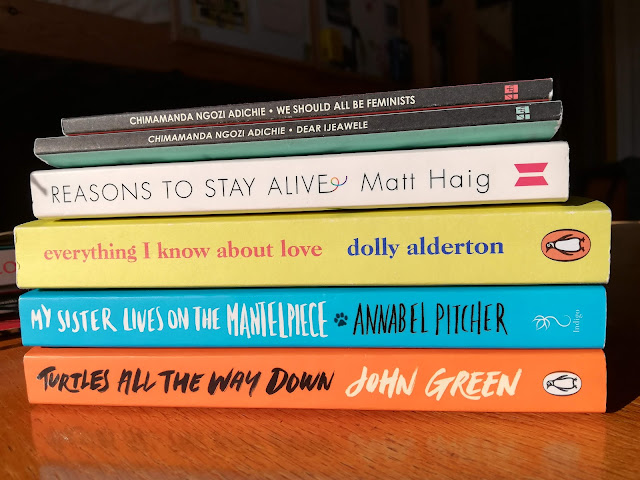6 Books I've Read So Far in 2020
*spoilers*
Reasons to Stay Alive by Matt Haig
This book is a must-read for literally everyone.
Especially if you are or have ever suffered from poor mental health. It is easy to read and explains what happened during Haig's worst moments but also all the little things that made surviving that all worth it and what helped. Taking each day and moment step by step and getting through poor mental health patches really does show how strong we are as humans.
I also recommend reading Haig's newer book of a similar style called Notes on a Nervous Planet which I read last year in the patches on sunshine last summer on campus. It highlights the ways in which we live on a planet which isn't built for us and how switching off from everything around us can be so important. The way society has caused us to live our lives so on-edge and anxious isn't good for us so realising the ways the world does this and ways to combat it is so important.
"There is no standard normal. Normal is subjective. There are seven billion versions of normal on this planet."
We Should All Be Feminists by Chimamanda Ngozi Adichie
This book was adapted from a TED Talk which Adichie did into this book long essay talking all about what feminism means and how it is developing in the 21st century. I loved this read, although short, she touches on all my current thoughts about feminism and what it should mean.
"I am angry. We should all be angry. Anger has a long history of bringing about positive change."
I love this quote because it really does sum up how I feel about a lot of the global problems in society recently. I am angry and finding places to push my anger into positive change is how I cope with the anger. We all need to use our frustration with the system for feminism and for all causes because positive change is what is needed.
Feminism is something that people sometimes think has been solved already, but if you delve even into the surface of the problem, you realise this is not true. Much needs to be done to change attitudes and systems to make the world truly equal.
Dear Ijeawele by Chimamanda Ngozi Adichie
This wasn't originally written as a book either, but an email response to a friend asking about how to raise their daughter as a feminist and as this is Adichie's area, she responded. As the title suggests it includes fifteen suggestions about how to raise your daughter as a feminist by challenging gender roles, expectations of children and the kind of world that your child will grow up into. It also just identifies all the positive things you can do when raising a child which don't directly raise them as a feminist but as their own person who questions the world with curiosity and builds a strong sense of identity around their values.
Reading this may not have been directly relevant to me but it highlighted the inequality that is rife in childhood and how damaging it can be when growing up. This just demonstrates how important it is to stay positive and develop values and identity around who we are and what we believe in so it isn't a question about being a feminist or not because we know that is just right.
"'Because you are a girl' is never a reason for anything. Ever."
Everything I Know About Love by Dolly Alderton
As a young twenty-something, this book was just about the most relatable thing I could have found to read.
Alderton is a journalist and columnist and has lived the university and London life as well as I can imagine it would be lived. The book is about love but also so many other elements of growing up like friends and jobs and disasters that occur along the way. I related to a lot of Alderton's earlier memories when she had left university and was living in London, admittedly this does include the disastrous night out stories too.
I am loving reading books at the moment about people who are in their late twenties or early thirties because I know that is the next stage of my life once I graduate. It is so reassuring to see how messing up with any aspect of your life does not have to be the end of the world and you can get through, even if like Alderton, you need some therapy to keep it all manageable.
"Nearly everything I know about love, I've learnt from my long-term friendships with women."
As someone who is single and not likely to find a date soon, having a figure who also navigates that single life while their friends come in and out of long-term relationships which sometimes last all the way is refreshing. I sometimes struggle to find people in my own life who have these experiences so to read about it was exactly what I needed.
Some people may feel this book is too self-indulgent or cathartic on Alderton's part, but I find that, while living this period of life, I understand too well how it all feels and people like me sometimes need a faulty role model anyway.
Turtles All the Way Down by John Green
I haven't read a John Green book is some time, when I was very into them but probably not such a critical reader as I've become, but safe to say, I wasn't much a fan of this one. I liked how Green included really detailed examples and character descriptions of how it feels to deal with OCD which he does himself. I thought this representation of mental health was particularly brilliant, I simply thought the plot didn't really go anywhere so the story just became about the individual's character development however this could just be because I am not the group these books are targetted at anymore.
The story itself is about a girl, Ada, dealing with OCD around disease and bacteria in particular and how her and her best friend try and will a large reward for the finding of a missing billionaire. I like the premise but the story is slow and a lot of it is inside Ada's head and about her overthinking which I just didn't think fit with this kind of story.
The story itself is about a girl, Ada, dealing with OCD around disease and bacteria in particular and how her and her best friend try and will a large reward for the finding of a missing billionaire. I like the premise but the story is slow and a lot of it is inside Ada's head and about her overthinking which I just didn't think fit with this kind of story.
"Actually, the problem is that I can’t lose my mind,” I said. “It’s inescapable."
My Sister Lives on the Mantlepiece by Annabel Pitcher
When I started this book, I didn't expect to like it. Being narrated by a 10-year-old meant that it all seemed simple and the boy's life was hard but maybe he wouldn't understand it enough to affect him. And then you realise why his sister lives on the mantlepiece, so how she died. The fact this book allows itself to have racist characters who are role models to people's lives allows it to show the reality of how racism festers in society. Although the story may not end the way you would hope, although the racist father is never really taught how discriminatory he is, that is kind of more true than anything.
I think this quote sums up the book perfectly for me because you never realise how much a 10-year-old can learn when they broaden their cultural capital by meeting new people and when they learn that no, grown-ups are not always right. This gives us hope that he will grow up to learn that he doesn't have to think like his father about certain groups of people and that really his father is just fueled by sadness and anger over losing a child.
Photo by Jacob Le on Unsplash
"But just ’cos they’re grown-ups, doesn’t mean they’re always right."
I think this quote sums up the book perfectly for me because you never realise how much a 10-year-old can learn when they broaden their cultural capital by meeting new people and when they learn that no, grown-ups are not always right. This gives us hope that he will grow up to learn that he doesn't have to think like his father about certain groups of people and that really his father is just fueled by sadness and anger over losing a child.
Photo by Jacob Le on Unsplash




Comments